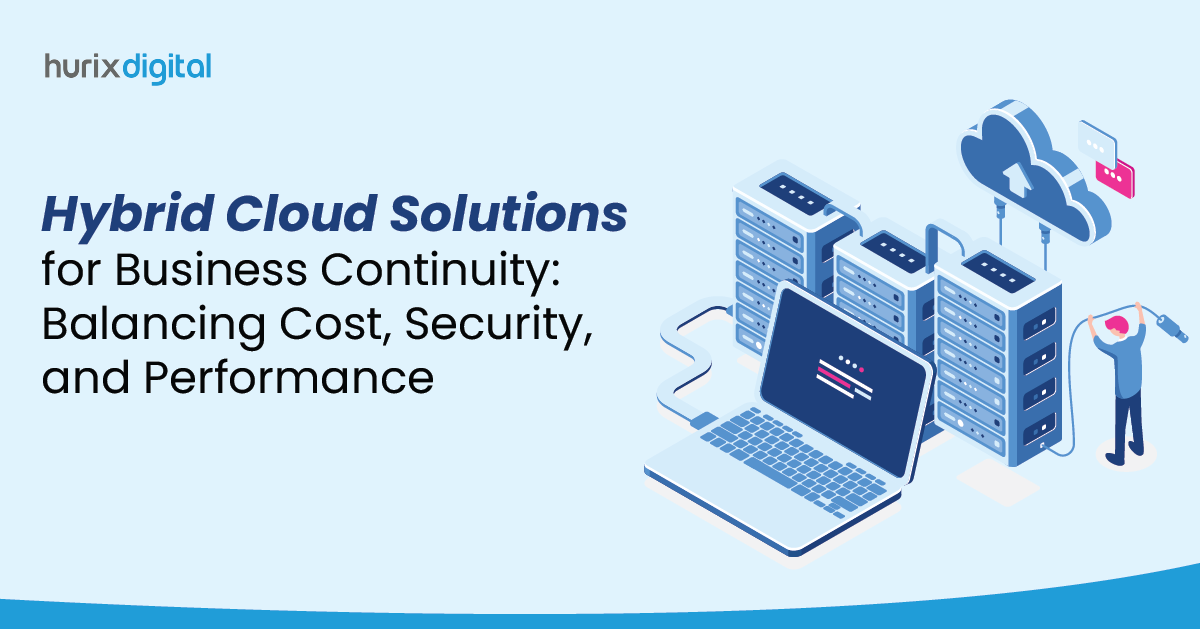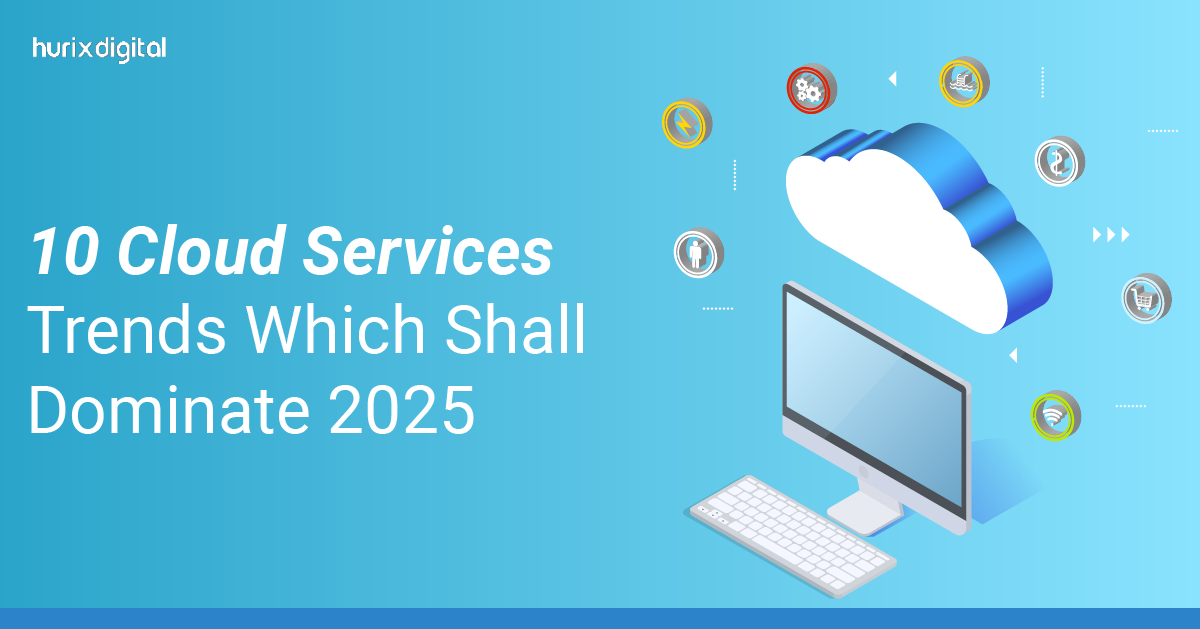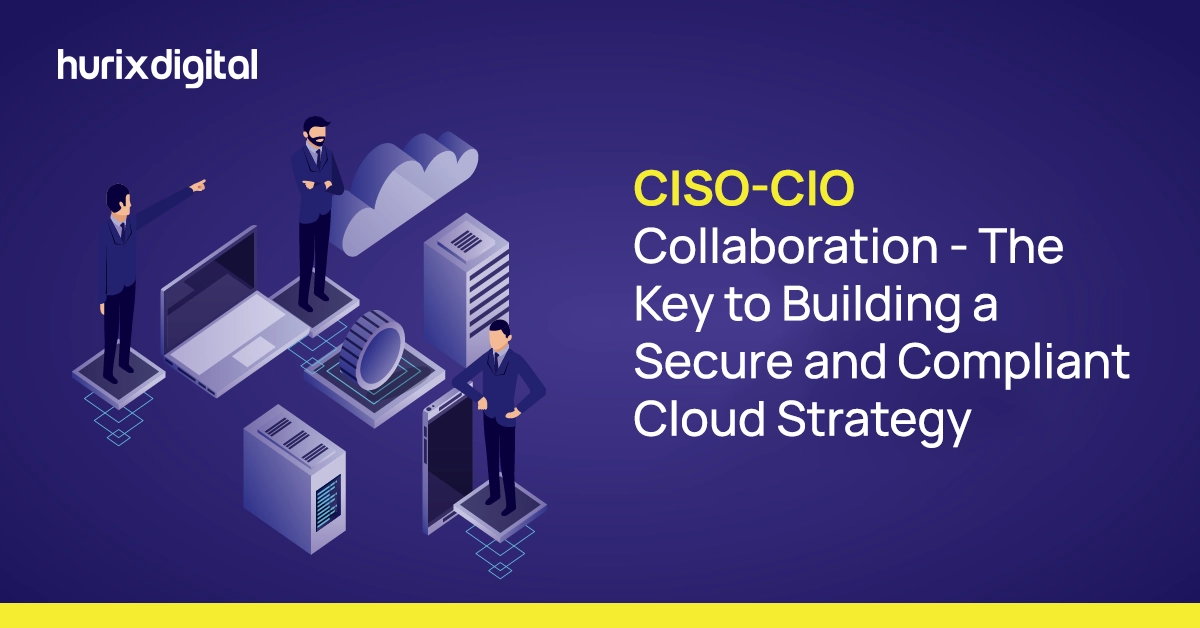
Hybrid Cloud Solutions for Business Continuity: Balancing Cost, Security, and Performance
Summary
This blog examines hybrid cloud solutions, highlighting benefits like cost optimization, security, scalability, and disaster recovery, plus implementation challenges and future trends.
In the modern world of economic globalization, enterprises and companies are under great pressure to keep businesses running smoothly while controlling their expenses. Cloud-managed IT services, particularly hybrid clouds, have thus been pivotal in achieving this balance.
Market estimations based on current trends state that the hybrid market is bound to grow to $262 billion by the year 2027 proving that these solutions are indeed vital for enterprise IT operations. This blog covers the importance of hybrid cloud solutions as they increase business continuity through costs, security, and performance.
Table of Contents:
- What is Hybrid Cloud Solutions?
- Key Benefits of Hybrid Cloud Solutions
- Real-World Applications of Hybrid Cloud Solutions
- Security and Compliance in Hybrid Cloud Environments
- Challenges of Implementing Hybrid Cloud Solutions
- Future Trends in Hybrid Cloud Solutions
- Conclusion
What is Hybrid Cloud Solutions?
A hybrid cloud integrates private and public clouds and facilitates organizations’ use of cloud-managed IT services for better resource utilization. This architecture allows organizations to have some of the critical workloads locally while leveraging public clouds for expandable operations.
The framework of cloud-managed IT services in hybrid scenarios, therefore, involves a blend of private and public cloud assets, consolidated control systems, and safe connectivity options. Working with a trusted cloud services provider (CSP) ensures proper implementation and management of these components.
Also Read: Service Level Agreements (SLAs): The Key Elements of Cloud-Managed Services
Key Benefits of Hybrid Cloud Solutions
Organizations implementing cloud-managed IT services through hybrid solutions gain significant operational advantages. These benefits directly impact business continuity and operational efficiency:
1. Cost Optimization Through Resource Allocation
Organizations can reduce capital expenditure by strategically distributing workloads between private and public clouds. The cloud-managed services model enables pay-as-you-go pricing for public cloud resources while maintaining critical operations in cost-effective private environments.
For example, CVS Health adopted a hybrid cloud integration strategy that involved developing an API-centric approach to understanding and integrating its entire ecosystem. This holistic strategy led to a two-thirds reduction in integration costs, demonstrating the financial benefits of effective hybrid cloud implementation. By optimizing its resources, CVS Health not only enhanced service delivery but also positioned itself for greater operational efficiency.
2. Enhanced Security with Flexible Control
Hybrid solutions allow organizations to maintain sensitive data in private clouds while leveraging robust public cloud security features. This dual approach, managed through comprehensive cloud service management, provides maximum security without compromising operational flexibility.
For instance, Accenture’s hybrid cloud transformation resulted in over $20 million in savings between 2015 and 2018, demonstrating how strategic resource allocation and a cloud-first approach can lead to significant operational efficiencies.
3. Scalability Without Infrastructure Constraints
Businesses can promptly allocate resources during high activity levels without building physical or additional structures. The hybrid model ensures consistent performance during usage spikes while maintaining cost efficiency.
4. Disaster Recovery Capabilities
With hybrid cloud implementations, organizations achieve faster recovery times through distributed resources. Companies can restore operations within milliseconds using properly configured hybrid environments.
Real-World Applications of Hybrid Cloud Solutions
To illustrate the effectiveness of hybrid cloud solutions, consider the following case studies:
Case Study 1: Retail Giant Adopts Hybrid Cloud for Enhanced Scalability and Customer Experience
A top worldwide retailing firm found that it struggles to manage its substantial on-premises investment while trying to offer increased flexibility and elasticity for online business.
By adopting a hybrid cloud approach, the company effectively transferred non-essential workloads to the public cloud during peak times, thereby enhancing website performance and customer experience; this strategic shift also contributed to lowering operational expenses.
Case Study 2: Financial Services Organization Utilizes Hybrid Cloud for Data Security and Regulatory Compliance
A medium-sized financial services organization sought to modernize its IT framework while remaining compliant with stringent data security and privacy regulations.
The organization established a harmonious balance between security, compliance and scalability by retaining sensitive information on a private cloud and relocating less critical workloads to a public cloud. Consequently, this allowed for increased operational efficiency and sustained digital transformation.
Security and Compliance in Hybrid Cloud Environments
As organizations pursue cloud adoption, security and compliance become critical success factors. The hybrid approach offers comprehensive solutions to these challenges:
1. Data Protection Framework
Hybrid environments enable end-to-end encryption across all systems, with secure data transfer protocols between private and public clouds. This round-the-clock protection leads to continuity of business with no compromise to the data quality.
2. Regulatory Compliance Management
Regulated and non-regulated applications can run in the same environment, as the compliance-certified private cloud can contain regulated company information safely, while a public cloud is perfectly suitable for non-regulated data. This flexibility is particularly valuable for companies operating across multiple jurisdictions.
3. Identity and Access Control
A unified identity management system across cloud environments ensures consistent security policies. This centralized approach, coupled with multi-factor authentication, significantly reduces security risks.
Challenges of Implementing Hybrid Cloud Solutions
While cloud-managed IT services offer numerous benefits, organizations must address several key challenges during their cloud transformation journey:
1. Integration Complexity Management
Organizations often struggle with legacy system compatibility and data synchronization between environments. Successful implementation requires careful planning and expertise in multiple cloud platforms.
2. Skill Gap and Resource Allocation
The need for specialized expertise across multiple cloud platforms creates significant training requirements. Companies must invest in continuous learning programs to maintain effective operations.
3. Cost Control and Optimization
Complex billing across multiple cloud providers and hidden data transfer costs require sophisticated monitoring and management systems. Organizations need robust financial planning to maximize ROI.
4. Performance Monitoring and Optimization
Managing organizational performance in hybrid environments is complex and requires appropriate tools and knowledge. Thus, organizations need to invest in integrated monitoring solutions for them to run effectively.
Despite these challenges, implementing cloud-managed IT services through hybrid cloud solutions offers organizations the perfect balance of cost efficiency, security, and performance. Accenture’s experience, where they increased their cloud footprint from 9% to 90% while achieving substantial cost savings, is a prime example of how businesses can enhance continuity and operational effectiveness through cloud solutions.
Future Trends in Hybrid Cloud Solutions
The evolution of cloud-managed IT services continues to shape the future of hybrid cloud solutions. Here are the key developments driving innovation:
1. AI and Automation Integration
As per recent implementations including in GE Digital, Integration of AI-powered resource optimization and Automated security responses are identified as the new normal in Hybrid cloud infrastructure.
2. Edge Computing Enhancement
Currently, the incorporation of edge computing with hybrid clouds has minimized latency, making real-time processing more efficient. Walmart’s example of integrating 10,000 edge nodes proves the direction’s popularity.
3. Security Evolution
Zero-trust security architectures and enhanced encryption standards are fundamental to hybrid cloud implementations. These advances ensure stronger protection against emerging threats.
Also Read: What is Cloud Adoption?10 Key Benefits of Adopting Cloud Computing for Businesses
Conclusion
The strategic implementation of cloud-managed IT services through hybrid cloud solutions offers organizations the perfect balance of cost efficiency, security, and performance. As companies perpetually evolve and adapt in this new age of digital transformation strategies, these companies must seek the help of seasoned service providers.
Connect with Hurix Digital today to explore how our cloud-managed IT services can help optimize your hybrid cloud implementation and ensure business continuity.

Vice President and Strategic Business Unit Head – Cloud Services
A top technology management voice on LinkedIn with 20 Years of experience in Information Technology, Cloud Services, Digital Transformation, Application Modernisation, Managed Services, IT Security Engineering and Operations Management. An avid technology Leader, Leadership Speaker, Author & Coach.







